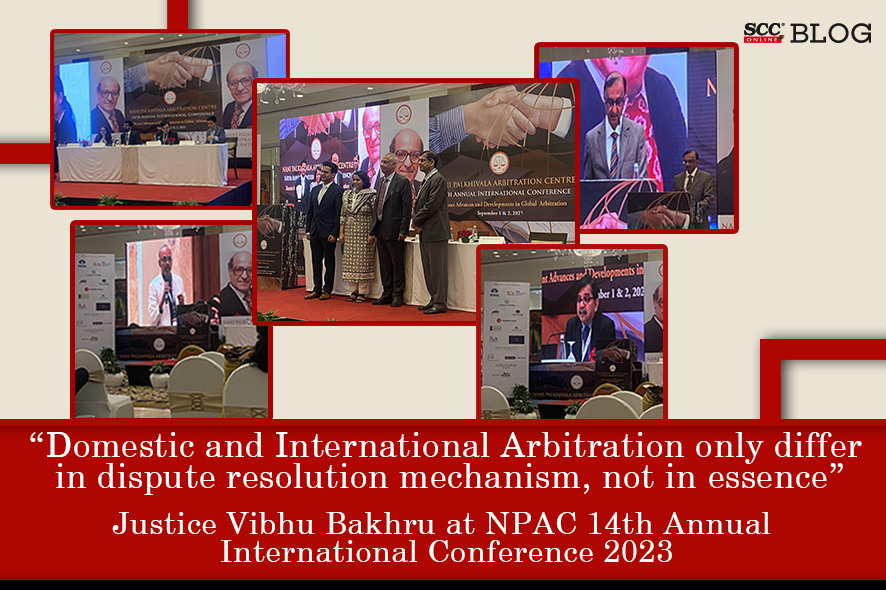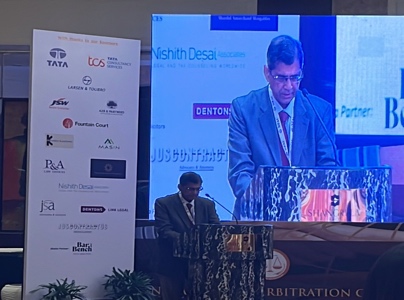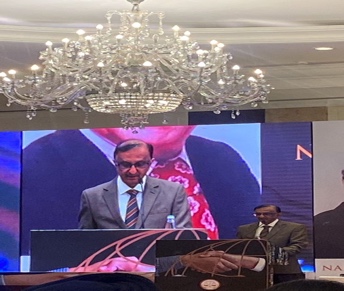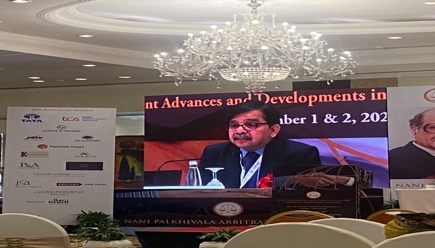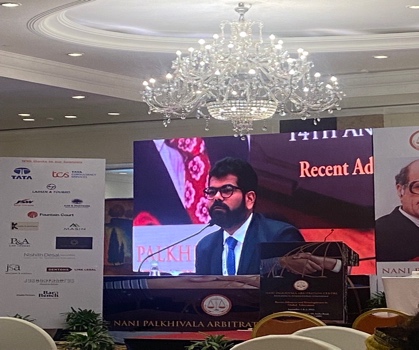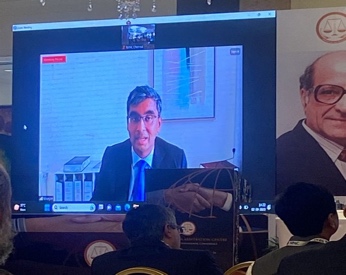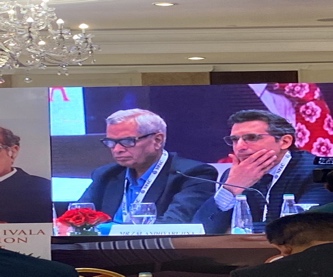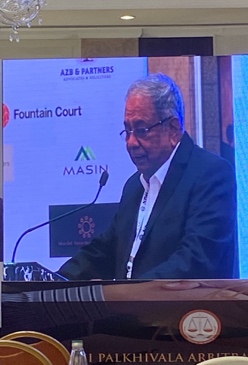The Nani Palkhivala Arbitration Centre (‘NPAC’) conducted 14th Annual International Conference 2023 on ‘Recent Advances and Developments in Global Arbitration’ on September 1st and 2nd at Shangri-La’s-Eros Hotel, New Delhi.
The NPAC constantly strives to educate relevant stakeholders on the benefits of institutional arbitration as a desirable method of dispute resolution. It institutionalises effective measures for the growth of arbitration laws in India and to build an efficient and competent arbitral regime.
The agenda of the Conference included paper presentations by eminent practitioners of Arbitration law from all over the world, partners, associates of domestic and foreign law firms, as well as panel discussions on advances and developments in arbitration in the global scenario with focus on the specific themes of the conference.
The Conference was divided in two- days session on 1st and 2nd September, 2023.
September 1st, 2023 (6:30 to 8:00 pm)
On 01-09-2023, there was a fireside chat on the topic ‘The Holy Grail of Excellence in Legal Services – What is the Way Forward for India?’
Panelists for the Chat Session:
Justice Vibhu Bakhru, Judge, Delhi High Court and Chairperson of the Arbitration Committee of the Delhi International Arbitration Centre (DIAC); Mr. V.K. Rajah, International Arbitrator, former Judge of the Supreme Court of Singapore and former Attorney General of Singapore; Mr. Gaurav Pachnanda, Senior Advocate at Supreme Court of India and Barrister, Fountain Court Chambers, London and Singapore; Ms. Pallavi Shroff, Managing Partner and Head, Dispute Resolution Practice of Shardul Amarchand Mangaldas & Co.; Mr. Alex Taylor, Senior Clerk, Fountain Court Chambers, London and Singapore.
The welcome address was given by Arvind P. Datar, Senior Advocate, Director, NPAC. Alex Taylor begins the panel discussion as a moderator of the fireside chat on the topic ‘the holy grail of Excellence in Legal Services- what is the way forward for India?
Alex Taylor was the moderator of the fireside chat.
Justice Vibhu Bakhru discussed the developments in Delhi High Court and pointed that the developments are not recent such as DIAC established in 2014. He said that Domestic arbitration and International arbitration are not different. It is just the dispute resolution mechanism which is different.
VK Rajah said that the focus today is on commercial world, but we need to see the entire ecosystem. Hence, clearing of backlog is going to be painful in comparison to other G20 countries. He also said that there should be right culture for commercial arbitration. On the question of backlog of cases, he said that India has done extremely well in the past 10 years but that is not enough in clearing the backlog. He also talked about liberalisation and how it affects India and how international firms can dominate the market unless the arrangement is done intelligibly.
Pallavi Shroff praised the Delhi High Court for functioning in hybrid mode. On the question of unique requirements for parties challenging in India, she talked about challenges in cases of International clients, fear of backlog of cases in international clients have been seen lot of times. She pointed that there is need of equality at the Bar and the letting go of subconscious biased notions. Ms. Shroff also agreed with Mr. VK Rajah regarding the Rules made by BCI, how they are not well thought through and it goes against Rules laid down by Supreme Court.
Gaurav Panchananda said that “our bigger aspiration is that India becomes arbitration friendly and thrives in such ecosystem”. He said that greater attention is required for building domestic arbitration ecosystem.
September 2nd, 2023 (9:30 am to 5:30 pm)
-
Inaugural Session (09:30 am to 10:30 am)
The welcome address was given by Arvind P. Datar, Senior Advocate, Director, NPAC. He said that “it was in 2004 when we thought that, why don’t we start our own arbitration centre, when an Indian party was referred to Singapore Arbitration Centre.”
He also said that NPAC was started in 2005, and it has its own arbitration rules. The then Chief Justice of Madras High Court Markandey Katju recognised the institution for the first time.
The conference concept note was delivered by N.L. Rajah, Senior Advocate, Director, NPAC delivered.
Four concepts that were taken as topics for the panel discussions were highlighted by Mr. N.L. Rajah, namely-
- Contentious Issues in Construction Arbitration
- Key Issues in Oil, Gas and Renewable Energy
- Dispatches from the Frontiers of International Arbitration
-
Future of Arbitration in the Era of Artificial Intelligence
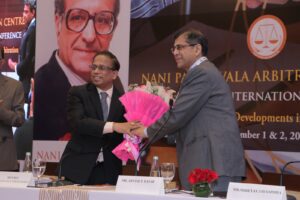 The inaugural and keynote address were delivered by Justice K.V. Viswanathan, Judge, Supreme Court of India. He said that “nothing can begin without a tribute to Mr. Nani Palkhivala. A man with such talent whom I admire him”. He also said that he had recently read an interesting article on artificial intelligence (‘AI’) and decision making, wherein it was conceived that AI technology can easily be used in proof reading, case management, etc. However, Justice Vishwanathan was of the view that in core functioning of decision making, AI cannot play a very substantial role.
The inaugural and keynote address were delivered by Justice K.V. Viswanathan, Judge, Supreme Court of India. He said that “nothing can begin without a tribute to Mr. Nani Palkhivala. A man with such talent whom I admire him”. He also said that he had recently read an interesting article on artificial intelligence (‘AI’) and decision making, wherein it was conceived that AI technology can easily be used in proof reading, case management, etc. However, Justice Vishwanathan was of the view that in core functioning of decision making, AI cannot play a very substantial role.
Panel Discussion — I (10:45 am — 12:00 noon)
The first panel discussion was on the topic ‘Contentious Issues in Construction Arbitration’, chaired by Justice Navin Chawla, Judge, Delhi High Court.
The speakers at the discussion were- Ankit Khushu, Partner, Kachwaha & Partners; Prateek Jain, Partner, Masin Projects; Amba Prasad, Head Legal, Larsen & Toubro Ltd. Construction Division.
Justice Navin Chawla highlighted the issues that Judges face day to day in Courts, relating to the arbitration matters. He pointed that one of the major issue is the ‘construction’ of the Construction contracts. He also discussed about the latent and patent defects that arise during the claim.
Ankit Khushu, covered the sub-topic ‘Use of Experts in Construction Arbitrations’. The role of experts as a witness in arbitration proceedings was discussed at lengths by her. She said that the experts are must and inevitable in arbitration proceedings of ‘construction contracts’. She also threw some light on the three types of Experts used in the arbitration:
- Delay: Factum and Extent of Delay
- Quantum: Qualification of damages for delay
-
Technical: On meeting the guaranteed parameters; change in design, etc.
Prateek Jain spoke on the sub-topic ‘Delay and quantum expert evidence – Is its value underestimated or exaggerated?’. He said that it is the independent perspective of the expert witness which helps the case. He also added that in global arena, there is over dependence on the experts. On the requirement of the quantum expert evidence, he said that it is related to the issue of the delay of the arbitration, delay and quantum go hand in hand.
Panel Discussion II – (12:00 noon — 1:15 pm)
The second panel discussion was on the topic ‘Key Issues in Oil, Gas and Renewable Energy’, chaired by Justice S. Muralidhar, Retd., Chief Justice of Orissa High Court, Judge Punjab and Haryana High Court and Delhi High Court.
The speakers at the discussion were- Anuja Tiwari, Senior Partner, AZB & Partners; Payel Chatterjee, Partner, Trilegal; Akshat Jain, Partner, JSA Advocates & Solicitors.
Justice S. Muralidhar, pointed that in an ICC Report it was highlighted that 90 percent of the disputes revolve around energy claims. He also said that within the State, bureaucracy comes in. In arbitration, the costs are very high and unnecessary delay in arbitration proceedings, mounts it more.
Anuja Tiwari said that climate change is a matter of justice now and not just a national or international issue, if we talk about energy as a resource, the mandate is very clear. If arbitrations were to happen, they have to happen with a perspective. On the question of the requirements in arbitration community in India in order to push quick resolution of the matters, Anuja Tiwari said that “when you are sitting on a table, transacting a contract, it is required that the contract is drafted very carefully and open ended clauses must be avoided. We can even go for mediation before going to the full blown arbitration and litigation
Payel Chatterjee said that understanding the complexity of the energy arbitration, we can even go for mediation before going to the full-blown arbitration and litigation. She also said that enforcement of award is an issue in both International and Domestic arbitration.
On Justice Muralidhar’s question that do we have enough experts who can be relied upon to help settle the disputes in energy space? Akshat Jain answered that India is looking at an increasing need of the people in this sector and there are no rules or statutes which provides for these experts. He also said that today we are in a very exciting space concerning renewable energy. A transition mode, where we are seeing new players entering the market. The energy contracts are all long-term contracts spanning across years. The life cycle of these projects must be looked at.
Panel Discussion — III (2:00 pm — 3:15 pm)
The third panel discussion was on the topic ‘Dispatches from the Frontiers of International Arbitration’, chaired by Justice Yashwant Varma, Judge, Delhi High Court.
The speakers at the discussion were- V. Niranjan, Barrister, One Essex Court Chambers; Mark McNeill, Partner, Quinn Emanuel Urquhart & Sullivan LLP; Dr. Chintan Chandrachud, Barrister, Brick Court Chambers; Divyam Agarwal, Partner, JSA Legal.
V. Niranjan discussed the sub-topic ‘Issue estoppel and the concept of privity in arbitration’. He said that the litigation has from the past many decades become multi-jurisdiction and the one issue that has arisen with it is third party funding issue. He also said that it is the concept of privity which extends the estoppel to parties.
Mark McNeill threw some light on the sub- topic ‘Increased internationalization of tax disputes’. He shared three main categories of cross border fiscal disputes which included Tax- related investment disputes in Investor -State arbitrations. He also discussed the term ‘tax measure’ and how it has not been properly defined in any of the tax treaties. He also pointed that Tribunals typically apply an autonomous test to determine the tax measure. He also said that most investment treaties do not exclude taxation from their scope, particularly older generation treaties. They tend to exclude only 3 types: 1. General/ comprehensive exclusions 2. Targeted carve- outs 3. Multi — layered carve- outs.
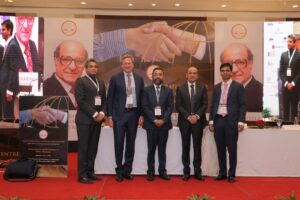
Dr. Chintan Chandrachud talked on the sub- topic ‘Reforms to the English Arbitration Act’. He gave some highlights of the reforms which have been proposed to the Arbitration Act by the Law Commission. He said that the reforms majorly are- 1. Governing law- What is the law of the seat? There is absence of law governing the choice of seat. The law of the seat is what governs the arbitration. 2. Challenges of awards on substantive jurisdiction. He said that the Law Commission proposes to alter the applicability of the Kompetenz-kompetenz principle, to which he was hopeful that it does not adopt this proposed change.
Divyam Agarwal covered the ‘Severing and Setting aside of Awards’. He said that the doctrine of severability has evolved from time to time, severing the good and bad part of the Section 34 of the Arbitration and Conciliation Act, 1996. He also said that the NHAI v. Trichy Thanjavur Expressway Ltd. provides much needed exposition on the doctrine of severability and that Justice Varma undertook a comprehensive review of the doctrine of severability. He said that Under Section 48 if there is partial enforcement of foreign award, the Courts can refuse to enforce the award. He also said that the Indian law is settled that foreign awards can neither be modified nor be set side at the stage of enforcement under Section 48 of the 1996 Act.
Panel Discussion — IV (3:15 pm — 4:30 pm)
The fourth panel discussion was on the topic ‘Future of Arbitration in the Era of Artificial Intelligence’, chaired by Tejas Karia, Partner, Head — Arbitration, Shardul Amarchand Mangaldas & Co.
The speakers at the discussion were- Alipak Banerjee, Nishith Desai Associates; Anushka Sharda, Partner, Khaitan & Co.; Atul Sharma, Managing Partner, Link Legal; Zal Andhyarujina, Senior Advocate & Fountain Court Chambers, London
Tejas Karia said that Chat GPT is a bot which can answer the questions, however, there are lot of challenges that we face. Such as misleading statements, wrong responses to legal issues, etc. He also said that there are obviously many risks and limitations, but AI is here to stay.
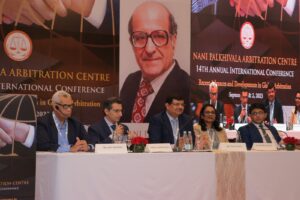
Alipak Banerjee threw light on the sub- topic ‘Chat GPT and AI — Use and Misuse in International Arbitration’. He said that these tools are trained to provide search results, it has issues, but what is important is that they do deliver results. He also said that AI apps helps in providing preliminary legal advice. He also said that he asked chat GPT a question that when the data set was updated? The answer was September 2021, which highlights the inadequacy of the relevant data. He also pointed some risks with AI, namely- outdated datasets; false information; non reliable information.
Anushka Sharda discussed the sub-topic ‘Limitations of AI — Ethical and Enforceability Concerns’. She said that there are four use cases of AI. 1. Use of AI in arbitrator selection 2. AI’s role in case preparation and expert reports 3. AI as a tool in aiding arbitrators decisions 4. AI substituting human arbitrators all together. She also highlighted that on data scarcity in arbitration, Generative AI can hallucinate without sufficient data training and chat GPT can fabricate non-existent case laws.
Zal Andhyarujina spoke on the sub- topic ‘Use of Technology in Arbitration — Benefits and Risks’. He said that the technology has brought about small and large changes on arbitration. He said that the process of arbitration itself tells that AI cannot play a substantive role, especially regarding the involvement of the counsel, the ways in which a counsel puts a point before the arbitrator. The value Judgments which counsel makes. He also said that the preparation of evidence cannot be done properly with AI.
Valedictory Session (4:45 pm — 5:30 pm)
The Valedictory Address was given by Padma Shri Dr. T.K. Viswanathan, Former Union Law Secretary, Secretary General of the 15th Lok Sabha, Parliament of India. Shreyas Jayasimha delivered the vote of thanks. He said that he was very thankful to everyone who attended the conference from every corner of the Country and all the speakers who came from outside the Country.


